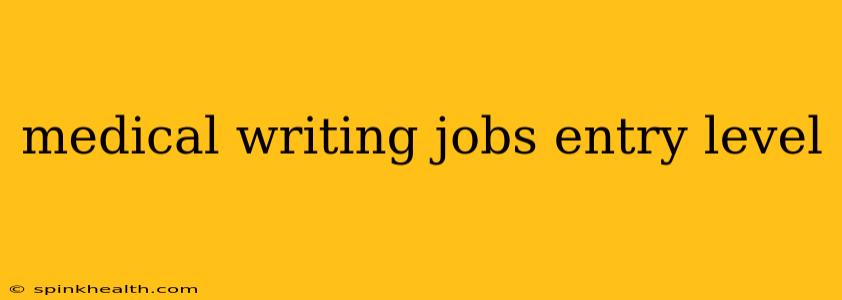Breaking into the World of Medical Writing: An Entry-Level Guide
The world of medical writing may seem daunting, filled with complex terminology and rigorous standards. But for those with a passion for clear communication and a knack for detail, it offers a rewarding and intellectually stimulating career path. Landing an entry-level medical writing job requires dedication, strategic planning, and a proactive approach. This isn't just about crafting compelling copy; it's about ensuring accuracy, clarity, and accessibility in critical health information. My journey into medical writing began much like yours might—with a burning desire to combine my love of words with my fascination for the medical field. Let's explore how you can navigate this exciting field.
What Does an Entry-Level Medical Writer Do?
Many aspiring medical writers wonder, "What exactly is an entry-level medical writing job?" The reality is that entry-level roles often involve a blend of tasks, providing a strong foundation for future specialization. You can expect to contribute to various projects, including:
- Literature Reviews: Sifting through research papers and summarizing key findings in a concise and accurate manner.
- Manuscript Preparation: Helping senior medical writers format and prepare manuscripts for submission to journals.
- Data Entry and Organization: Managing and organizing clinical trial data, ensuring accuracy and consistency.
- Medical Content Creation: Drafting sections of larger documents, such as medical device manuals or patient education materials.
- Proofreading and Editing: Polishing drafts for grammar, style, and clarity, paying close attention to medical accuracy.
These tasks, while seemingly small, are vital building blocks. Mastering them showcases your commitment to detail and builds your understanding of medical writing conventions.
What Skills Are Needed for Entry-Level Medical Writing Jobs?
Landing your dream entry-level position requires a blend of hard and soft skills.
Essential Hard Skills:
- Strong Writing and Editing Skills: This is paramount. Your ability to craft clear, concise, and error-free medical text is your most valuable asset.
- Medical Terminology and Knowledge: A solid foundation in medical terminology is essential for understanding the complexities of medical information.
- Research Skills: You'll be working with scientific literature, so excellent research abilities are crucial.
- Data Analysis Skills: For some roles, the ability to understand and interpret data will be a significant advantage.
- Software Proficiency: Familiarity with word processing software, citation management tools (like EndNote), and potentially statistical software is beneficial.
Essential Soft Skills:
- Attention to Detail: Accuracy is non-negotiable in medical writing. The smallest error could have significant consequences.
- Time Management: Meeting deadlines is a crucial aspect of the job, often requiring balancing multiple tasks simultaneously.
- Teamwork: You'll be collaborating with other writers, editors, and medical professionals.
- Communication Skills: Clear and concise communication, both written and verbal, is essential for effective collaboration.
- Adaptability: Medical writing projects vary greatly; adaptability is vital for success.
How to Find Entry-Level Medical Writing Jobs?
The job search itself is a marathon, not a sprint. Be patient and persistent. Here's how to increase your chances:
- Network: Attend industry events, connect with medical writers on LinkedIn, and reach out to professionals in your network.
- Online Job Boards: Utilize sites like Indeed, LinkedIn, and specialized medical job boards.
- Company Websites: Directly visit the career pages of pharmaceutical companies, medical device manufacturers, and healthcare organizations.
- Internships: Gain valuable hands-on experience through internships or volunteer work in related fields.
- Freelancing Platforms: Consider starting with freelance medical writing gigs to build your portfolio and gain experience.
What Education/Certification is Required for Medical Writing Jobs?
While a specific degree isn't always mandatory, a background in science, healthcare, or English is advantageous. Many medical writers hold bachelor's or master's degrees in these or related fields. Certifications, such as those offered by the American Medical Writers Association (AMWA), can significantly enhance your credibility.
Is Medical Writing a Good Career?
Yes, if you have a passion for writing, science, and a commitment to precision, medical writing can be an exceptionally fulfilling career. It offers opportunities for intellectual growth, continuous learning, and a tangible impact on healthcare communication. The demand for skilled medical writers continues to grow, making it a stable and rewarding career path.
The journey into medical writing might feel challenging initially, but by developing the necessary skills, actively seeking opportunities, and maintaining persistence, you can successfully navigate this rewarding and significant field. Remember, your passion for clear communication and dedication to accuracy will set you apart.

